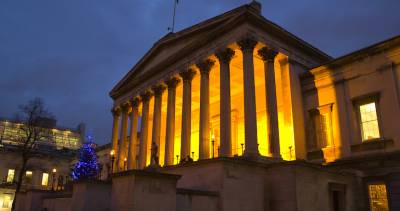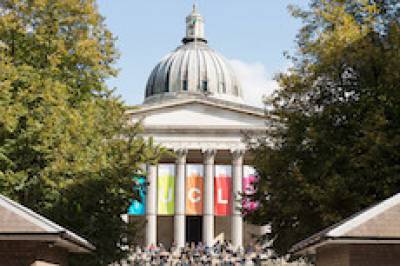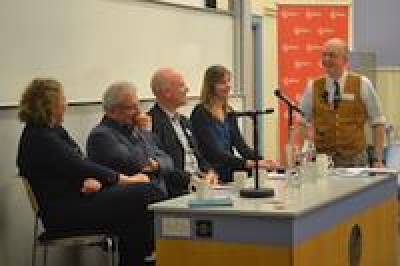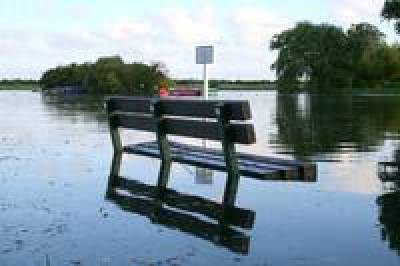Resources

- UCL letter to Friends of the Earth
- Events
- Blog articles by UCL academics
- UCL in the media
- A selection of relevant UCL papers and reports
To contribute something, please contact Jennifer Hazelton.
What is COP?
COP21
In December 2015, France hosted and presided over the 21st Session of the Conference of the Parties to the United Nations Framework Convention on Climate Change UNFCCC (COP21), otherwise known as "the 2015 Paris Climate Conference".

COP21 was a landmark conference, as it achieved the first ever universal, legally binding agreement on climate, with the aim of keeping global warming to well below 2°C.
UNFCCC
The international political response to climate change began at the Rio Earth Summit in 1992, where the 'Rio Convention' included the adoption of the UNFCCC.
This convention set out a framework for action aimed at stabilising atmospheric concentrations of greenhouse gases (GHGs) to avoid "dangerous anthropogenic interference with the climate system." The UNFCCC which entered into force on 21 March 1994, now has a near-universal membership of 195 parties.
UCL at the forefront
- Summary of UCL's published contribution to COP21
- For expert academic input, you can directly search UCL's "Find an Expert" database.
Here at UCL we have extensive expertise across the wide range of issues, considerations and subjects which fed into the negotiations and discussions which took place ahead of, during, and following the 2015 COP. This expertise spans Departments, Faculties and disciplines, so is hosted by the UCL Environment Domain. This webpage is designed to signpost some of the vital information, events and activities which happened across UCL in the aftermath of COP21.

UCL was invited in April 2016 to write a letter to Friends of the Earth outlining the University's contribution to climate change following on from the historic Paris Agreement. Read UCL's response online, which gives plenty of detail of our activities.
If you would like more information, please email Jennifer Hazelton, Strategic Research Facilitator for the Environment Domain.
Some individual Departments have information relating to their academics' activities, such as the Department for Science, Technology, Engineering and Public Policy (STEaPP)'s page on Contributing to IPCC.
Lancet Commission
The 2015 Lancet Commission on Health and Climate Change mapped out the impacts of climate change, and the necessary policy responses, to ensure the highest attainable standards of health for populations worldwide. This Commission is multidisciplinary and international, with strong collaboration between academic centres in Europe and China. The central finding from the Commission is that tackling climate change could be the greatest global health opportunity of the 21st century.
Events Column
Past events

"The Paris Agreement - What does it mean for Africa?" UCL-Energy holds second event in the French Embassy and UCL-Energy collaborative series
24 March 2016
On March 23rd UCL-Energy held the second in the series of events organised jointly by UCL-Energy and the French Embassy, under the auspices of the long-established relationship between the French Embassy's Science and Technology Department and UCL's Grand Challenges programme. The event was organised by UCL's Department of Science, Technology, Engineering and Public Policy (STEaPP) and UCL-Energy, in collaboration with the French Embassy and with support from the Climate Development Knowledge Network (CDKN).
This event titled "The Paris Agreement - What does it mean for Africa?" consisted of an all-day research collaboration workshop and an evening high-level panel discussion about the implications of the Paris Agreement for Africa and its development.
Climate Change and Global Citizenship: the post-Paris agenda
22 Feb 2016, 6pm, UCL
Speaker: Jonathan Poritt
Global citizenship is a much-loved rhetorical device for those who inhabit the world of international politics, with a long and honourable backstory. But it rarely translates into any substantive impacts on global policy-making or legal processes, and has literally zero resonance with the vast majority of global citizens!
However, it's already clear that decisions taken over the last few years regarding measures deemed necessary to address the challenge of accelerating climate change are now starting to change all that - and these measures represent just the tiniest sliver of what will need to be put in place over the next couple of decades. Which must surely mark the period during which the concept of Global Citizenship, at long last, grows up.
A drinks reception will follow in the North Cloisters.
Lecture and panel discussion on international climate change negotiations and the outcome of the Paris Conference
18 December
London
Twenty-five years after global negotiations were first launched, the 21st Conference of the Parties to the UN Climate Convention has finally resulted in a new global climate deal. On the 12th of December nearly 200 nations signed on to a legal agreement aimed to avoid the most dangerous effects of climate change, including goals for nearly all countries to cut greenhouse gas emissions. How did we get here and what does the climate deal mean for the world? This session examined this question and the potential impact of the Paris agreement on the planet, politics, industry and other areas.
This event, chaired by the BBC News Environment Analyst Roger Harrabin, combined a lecture by Michael Grubb, Professor of International Energy and Climate Change Policy, UCL Institute for Sustainable Resources followed by a panel discussion with Q&A on the significance, potential impact and future challenges for the Paris Agreement.
Panel participants included Dan Osborn - Professor of Human Ecology, Dept of Earth Sciences, Faculty of Maths & Physical Sciences, UCL and Paul Ekins - Professor of Energy and Environment Policy, UCL Institute for Sustainable Resources.
China low carbon policy options
5 December
Paris
Chaired by Eleonora Arcese of Climate Strategies. Speakers included Liu Qiang, National Centre for Climate Change Strategy and International Cooperation (Introduction to China low carbon policy), Michael Grubb, UCL Energy Institute (Low Carbon Mitigation Options in China - Introducing the China Special Supplement of Climate Policy Journal), Can Wang, Tsinghua University (China's Sectoral Strategies) and Duan Maosheng, Tsinghua University (Chinese ETS schemes: pathway towards a national scheme).
The Path for Low Carbon Shipping
5 December
Paris, COP21 Side Event
Read the Climate Change News write up
Shipping accounts for almost 3% of global emissions and, according to the Third IMO GHG Study, these emissions are expected to increase by between 50% and 250% by 2050. Such an increase would undermine efforts made in other sectors and challenge the 2 degree target. While some efforts have been made to put shipping on a sustainable path, many suggest that more effort is needed and can be done. This event considered what options are available, and how a successful COP Agreement could contribute to this objective.
Speakers included Tristan Smith - Lecturer at the UCL Energy Institute and lead author of the Third IMO GHG Study.
Climate clubs as implementation tool of the Paris agreement
3 December
UNFCCC COP21 Side Event
Multilateral negotiations can be complemented with coalitions on various climate-related issue areas where there is a need for a high degree of policy coordination. This event examined the idea of "clubs" of enhanced ambition based around the interrelationship of pricing, technology investment, trade.
Speakers: Michael Grubb, UCL, also Stanley Foundation, University of South Pacific, Indian Institute of Technology, Georgetown University
Shipping, trade and 2°C
2 December, Paris
Speakers/organisers include Tristan Smith, UCL.
The IPCC's carbon budgets for 2°C offer a clear scientific framing against which the effectiveness of policies can be assessed. The focus in the run-up to Paris has been on nations' voluntary carbon reductions (their "intended nationally determined contributions"; INDCs) and how these relate to the international community's 2°C objective and the accompanying carbon budgets.
With specific emphasis on international trade, this session heard from six experts on how they envisaged the shipping industry developing within the mitigation challenges posed in Paris.
Climate Change and the Courts
1 December, London
UKELA, PEBA and ALBA put on this event to coincide with COP21/CMP11 to look at climate change and the courts, considering what is the future role of national courts, lawyers and the rule of law in dealing with climate change issues. Speakers looked at a range of issues including the Climate Change Act and the possible outcomes of COP21/CMP11.
Speakers: Lord Carnwath, Supreme Court Justice; Professor Richard Macrory, UCL; Tom Burke, Chairman of E3G; Sarah Kohl, DECC. Chaired by James Maurici QC, Landmark Chambers.
The Secure & the Dispossessed: How the Military and Corporations are Shaping a Climate-Changed World
25 November, London
What if government and corporate elites have given up on stopping climate change and prefer to try to manage its consequences instead? In the weeks running up to the major UN Climate Change Conference in Paris (COP21), this event examined issues raised by a new book, The Secure and the Dispossesed: How the Military and Corporations are Shaping a Climate-Changed World (Transnational Institute). The book unveils a new climate security agenda in which dystopian preparations by the powerful are already fuelling militarised security responses to the unfolding climate crisis. But it also puts forward and tells the stories of the inspiring alternatives that promise a just transition to a climate-changed world.
Shock Waves: Managing the Impacts of Climate Change on Poverty
24 November
Webinar featuring: Carlo Carraro (Vice-Chair, IPCC WG III and Co-chair, GGKP Advisory Committee), Stephane Hallegatte (Senior Economist, Climate Change Group, World Bank) and Paul Ekins (Director, Institute for Sustainable Resources, UCL).
The Green Growth Knowledge Platform (GGKP) hosted a webinar exploring how the two objectives of ending poverty and stabilizing climate change can be more easily achieved if considered together. The webinar was moderated by Carlo Carraro (Vice-Chair, IPCC WG III and Co-chair of the GGKP Advisory Committee), featuring a presentation of the new World Bank report by one of the authors of the report, Stephane Hallegatte (Senior Economist, Climate Change Group, World Bank), and a presentation as a discussant from Paul Ekins (Director, Institute for Sustainable Resources, UCL). This was followed by a moderated discussion with the audience.

Public engagement on the road to Paris - and beyond
12th November 2015, UCL.
The upcoming Paris negotiations are key to the UN process of achieving an agreement that will limit global warming - but how engaged are the public with the conference? What do they think about its goals and how the UK government should be involved?
Climate Outreach's founder and director of projects, George Marshall hosted a panel discussion with Dr Chris Shaw (Climate Outreach), Professor Chris Rapley (Professor of Climate Science at UCL), Ruth Davis (Senior Associate at E3G, former Political Adivsor at Greenpeace) and Dr Candice Howarth (Senior Research Fellow in climate change communications at Anglia Ruskin University). Updates and video of the event will be made public via Climate Outreach
The new universal Sustainable Development Goals for 2030: from vision to action
12th November, available via YouTube
At the recent United Nations Summit on the post-2015 development agenda, heads of state and government have adopted the new agenda that will orient the global efforts towards poverty eradication and sustainable development in the 21st century.
The new set of Sustainable Development Goals (SDGs) are the result of a worldwide participatory process taking more than two years that has included the voices of civil society, the business community and academia.
Amina J. Mohammed discussed the recent historic and unprecedented agreement by global heads of state and government to focus the post-2015 development agenda on poverty eradication and sustainable development.
Last Tango in Paris
16th November 2015
Can the UN be the broker of an international Climate Change Agreement and how will it affect the economy? World leaders are to meet for COP21 this year seeking to reach consensus on an international climate change deal. This Debate previewed the key issues and likely outcomes.
Host: Sir Nigel Knowles, Global Co-Chairman, DLA Piper Chair: Roger Harrabin, Environment and Energy Analyst
Speakers:
- Adrian Gault, Chief Economist of the Committee on Climate Change
- Dr Celine Herweijer, Partner, Price Waterhouse Coopers
- Anthony Hobley, CEO, The Carbon Tracker Initiative
- Teresa Hitchcock, Partner, DLA Piper UK LLP
- Professor Paul Ekins OBE, Professor of Resources and Environmental Policy, University College London
Organised by Pamela Castle and Sykes Environmental.
Franco-British bilateral conference on Climate Change Adaptation, Resilience & Risks
2nd June 2015
Write up by Anna Mavrogianni & Sofie Pelsmakers
On June 2nd, UCL and the French Embassy in London held talks and workshops for invited 'millenials' and UCL postgraduate students discussing future climate change adaptation to focus on how both countries and their capital cities are going to adapt to climate change challenges and how to increase resilience to climate change risks (watch the conference video here). This was followed by a public debate, hosted by the BBC's environment correspondent Roger Harrabin.
Blog posts
'Observing' the Paris Climate Change Conference: In the shadow of the Copenhagen Accord in flower
Adam Byrne, UCL Geography
Hosted by UCL Environment Domain blog, 18 December 2015
The Paris Agreement that was adopted last Saturday has been greeted with much fanfare and comment from those involved in the process. I had the privilege as a PhD student to attend the COP and was funded by the ESRC doctoral training school. In this brief commentary, rather than offer policy analysis of which there are now already copious amounts, I present here a sketch, as it were, of the COP as I experienced it...
In the aftermath of the Paris COP Agreement - grounds for optimism or pessimism?
Robert Lowe, UCL Energy Institute
Hosted by UCL Energy Institute blog, 16 December 2015
In contrast to the failure of the 2009 Copenhagen talks there is clearly more to celebrate with the Paris Climate Deal. The achievement of getting all 195 countries to commit to emission reduction is a diplomatic success, but at the level of concrete commitments, the deal falls well short of what is needed to prevent dangerous Climate Change. So what is my short list of indicators, and what is my overall assessment of prospects for the future?...

The Paris Agreement - A Fresh Start?
Paul Drummond, UCL Institute for Sustainable Resources
Hosted by UCL Institute for Sustainable Resources blog, 15 December 2015
On the 12th December 2015, after (just over) two weeks of intensive negotiations between nearly 200 nations, COP21 of the UNFCCC adopted the Paris Agreement - a new global commitment to address climate change. All parties were keen to avoid a repeat of the disastrous effort to secure such a global agreement in Copenhagen in 2009, where deep divisions and entrenched positions between counties and negotiating blocs prevented any substantive progress towards a common global agreement...
The Paris Agreement lacks focus on water
Simon Damkjaerv, UCL Institute for Sustainable Resources
Hosted by UCL Institute for Sustainable Resources blog, 15 December 2015
The world is celebrating the adoption of the Paris Agreement, but the role of water under a changing climate is still sidelined: Time to ride the momentum...
A case of cognitive dissonance?
Clive Shrubsole, UCL Institute for Environmental Design and Engineering
Hosted by UCL IEDE blog, 15 December 2015
I'm a lifelong Tottenham fan and can still remember the rollercoaster of previous years where preseason expectation often nosedived into frustration and disappointment. We were OK playing at home, but when playing away invariably folded often with heavy losses...
The ground-breaking Paris Agreement leaves no room for delay in cutting emissions
Steve Pye, UCL Energy Institute
Hosted by UCL Energy Institute blog, 15 December 2015
The achievements of the Paris Agreement are significant. The contrast with the failure of Copenhagen in 2009 are captured in the following Guardian headlines: Low targets, goals dropped: Copenhagen ends in failure (19th December 2009) and Paris climate change agreement: the world's greatest diplomatic success (14th December 2015)...
Two crucial omissions that could jeopardise Paris climate hopes
Tristan Smith, UCL Energy Institute
Hosted by The Conversation, 15 December 2015
One of the biggest gaps between the reality of our climate situation and the text of the Paris Agreement is in the absence of two sectors that are major contributors to the world's greenhouse gas emissions. Shipping and aviation were referred to in the world's previous climate change deal, the Kyoto Protocol, and were still referred to in the draft of the Paris Agreement until just a few days before it was signed. But they disappeared from the final text, perhaps in an attempt to secure a stronger agreement...
2 degrees or 1.5? Either way it's the local action that will count
Dan Osborn, Prof of Human Ecology, UCL Department of Earth Sciences
Hosted by the UCL Environment Domain, 14 December 2015
Given that a 2°C rise in global mean temperatures is thought to represent the "threshold" around which point dangerous impacts of climate change would kick in at a global scale; it must be a relief to risk assessors, as well as to the world's more vulnerable nations and communities, to see some margin for error being built into the policy position in the form of thinking on 1.5°C. Keeping below 2°C will be very challenging as we are already close to, or even at, 1°C...
The Paris Agreement - second time lucky?
Peter Mallaburn, UCL Bartlett School of Environment, Energy and Resources
Hosted by the UCL Energy Institute blog, 14 December 2015
As I said in the first part of this blog, the Paris Agreement is our second attempt at implementing the UNFCCC. The idea was to move away from the top-down mandatory, rich country approach of the Kyoto Protocol to a more bottom-up, voluntary approach with all countries involved. To their enormous credit, the negotiators have succeeded...
Five things you need to know about the Paris climate deal
Simon Lewis, UCL and University of Leeds reader
Hosted by The Conversation, 12 December 2015
The UN climate talks in Paris have ended with an agreement between 195 countries to tackle global warming. The climate deal is at once both historic, important - and inadequate. From whether it is enough to avoid dangerous climate change to unexpected wins for vulnerable nations, here are five things to help understand what was just agreed at COP21...
But what will our world look like?
Emma Terana, UCL Institute for Sustainable Resources
Hosted by UCL Institute for Sustainable Resources blog, 11 December 2015
I am in the business of foresight, projections and scenarios. As a scientist I cannot tell you what the future brings nor what our world will be under +2, 4 or 6 degree warming. What I can say, is that as an individual I have deep concerns...
Why we need a 'space race' approach to saving the planet
Christopher Grainger, Doctoral Candidate in Energy and Economics, UCL
Hosted by The Conversation, 2 December 2015
The space race might be a thing of the past, but the basic economic model still makes sense: massive, targeted investment in research & development remains the best way to make startling technical leaps forward and solve mankind's greatest challenges...
CSP vs PV - Understanding the current situation and future outlook
Seyed Mehdi Mohaghegh, UCL Institute for Sustainable Resources
Hosted by UCL Energy Institute blog, 30 November 2015
Next month, the largest concentrated solar power plant (CSP) in the world will launch its first phase at the Moroccan city of Ouarzazate on the edge of the Sahara desert. The project consists of four plants and could generate 580 MW of electricity. This possibly will be enough to supply electricity to more than a million homes in Morocco. The first phase of the project, called Noor1, has the generating capacity of 160MW...
Paris - outside looking in
Peter Mallaburn, UCL Energy Institute
Hosted by UCL Energy Institute, 30 November 2015
With COP21 upon us I must admit to being a bit of a Framework Convention outsider, which is, perhaps, a bit strange for the editor of Climate Policy Journal. In 1990, as a civil servant I worked, peripherally, on the Berlin Mandate. I was at COP 7 in Marrakech, but at the margins. Some of the 1995 IPCC WG1 report is mine. But mostly I have been outside the COP process looking in...
Explainer: how scientists know climate change is happening
Mark Maslin, Professor of Climatology, UCL
Hosted by The Conversation
The Paris climate conference will set nations against each other, and kick off huge arguments over economic policies, green regulations and even personal lifestyle choices. But one thing isn't up for debate: the evidence for climate change is unequivocal...
Straight Thinking and the Paris Climate Negotiations
Chris Rapley, Professor of Climate Science
Hosted by Huffington Post (04/10/2015)
In eight weeks time 195 nations will meet in Paris to agree on a course of action to respond to climate change. The aim is to prevent 'dangerous' human interference in the climate system. The decisions taken will affect us all. The need for straight thinking will be paramount...
How does the IPCC know climate change is happening?
Mark Maslin, Professor of Climatology, UCL
Hosted by The Conversation
Climate change is one of the few scientific theories that makes us examine the whole basis of modern society. It is a challenge that has politicians arguing, sets nations against each other, queries individual lifestyle choices, and ultimately asks questions about humanity's relationship with the rest of the planet...
We need to talk about the Climate
Chris Rapley, Professor of Climate Science
Hosted by Huffington Post (13/08/2015)
"I'm here to talk about the Future. As a climate scientist it is part of my job to explore what it might bring." Thus opens the play 2071, which I wrote last year with the playwright Duncan Macmillan, and performed at the Royal Court theatre in London, the Deutsches Schauspielhaus in Hamburg, and, more recently, at the BOZAR theatre in Brussels. I had never written a play before. I had never delivered a one-man show from prestigious stages. But when the director, Katie Mitchell, suggested the project I embraced the challenge. Because now, more than ever, we need to talk about the climate...
Why I'll talk politics with climate change deniers - but not science
Mark Maslin, Professor of Climatology, UCL
Hosted by The Conversation
There are many complex reasons why people decide not to accept the science of climate change. The doubters range from the conspiracy theorist to the sceptical scientist, or from the paid lobbyist to the raving lunatic...
Environment Domain blog
RSS feed
'Observing' the Paris Climate Change Conference: In the shadow of the Copenhagen Accord in flower
Friday, 18 December 2015
Author: Adam Byrne, UCL PhD Student in the Department of Geography The Paris Agreement that was adopted last Saturday has been greeted with much fanfare and comment from those involved in the process. I had the privilege as a PhD student to attend the COP and was funded by the ESRC doctoral training school. In […]
2 degrees or 1.5? Either way it's the local action that will count
Monday, 14 December 2015
Author: Dan Osborn, Professor of Human Ecology, Department of Earth Sciences. Published on 14th December, 2015. Given that a 2°C rise in global mean temperatures is thought to represent the "threshold" around which point dangerous impacts of climate change would kick in at a global scale; it must be a relief to risk assessors, as […]
Thoughts on UCL-French Embassy Event
Monday, 16 November 2015
Author: Professor Robert Lowe, Director of the UCL Energy Institute, first posted on the UCL Energy Blog 27 Oct 2015 On Tuesday 20 October 2015, UCL Energy Institute, UCL Institute for Sustainable Resources, UKERC and the French Embassy hosted 'Global Energy, Global Climate'. This was the first in a series of three events organised jointly by UCL […]
Media
You can contact the UCL Media Relations team for information about specific media activity or search the UCL "Find an Expert" online database.

UCL in the Media
The early success of COP21
18 December, 2015, EurActiv
Professor Michael Grub discusses how the Paris climate conference largely succeeded on its first day in global participation, low carbon innovation and carbon pricing.
Britain facing steeper emissions cuts
14 December, The Times (£)
Professor Simon Lewis (UCL Geography) said: "To meet a target of well below 2C above pre-industrial levels will require leaving the vast majority of fossil fuel reserves in the ground"
Paris climate deal: reaction from the experts
13 December, The Guardian
Even if this agreement is accepted in Paris, plenty of opportunities remain for governments to change and for legislatures to fail to ratify. It will be particularly difficult to deal with the US Congress. Ilan Kelman, UCL
Paris climate deal 'our best chance to save the planet', says Obama
13 December 2015, The Independent
"Time will reveal the true nature of the Paris Agreement. From epic turning point, to naïve expression of hope, it is the real-world actions that follow that will decide," said Professor Chris Rapley, a leading climate scientist from UCL.
Islands win a tougher climate deal
12 December, The Times (£)
Professor Michael Grubb (UCL Bartlett School of Environment, Energy & Resources) says the 1.5C target was not credible because it would require the government to raise energy prices and build thousands of onshore wind farms.
Building Greener Ships, to Keep the Sea From Rising
8 December 2015, The New York Times
Environmentalists and others say that too little has been done to rein in ship emissions. Tristan Smith's 2014 report for the IMO is mentioned, and he is quoted saying the shipping industry's emissions are "invisible to the general public"
9 Reasons 2015 was a Green Year in Shipping
7 December 2015, Hellenic Shipping News
As 2015 comes to an end, they explore 9 areas marking 2015 as a green year in the shipping industry, including number 3: The Sustainable Shipping Initiative Urges Reduction of CO2 Emissions, based on the UCL Energy Institute's Tristan Smith's report for the International Maritime Organisation on greenhouse gas emissions in shipping.
Paris climate deal must tackle shipping emissions, say experts
5 December 2015, Climate Home
Speaking at a side event of COP21, industry and observers warn the International Maritime Organization is letting key sector off the hook, including UCL Energy Institute's Tristan Smith, who said much deeper emissions intensity cuts were needed. Based on a 2C warming limit and the sector continuing to account for 2-3% of global emissions, the figure should be 80-90% by 2050.
Adapting to a warmer world
4 December 2015, BBC Newshour Extra
Mark Maslin, professor of climatology at UCL, was part of a panel of experts discussing adaptation potential and strategies. Discussion of food price hikes, fossil fuel subsidies and investment, human cooperation, equity of funding for adaptation, simple solutions (or floating cities!), living underground. Adaptation not because we have given in to climate change, or instead of mitigation, but to avoid suffering.
India seeks to balance development with need for clean energy
1 December 2015, Los Angeles Times
Michael Grubb, professor of international energy and climate change policy at UCL and an advisor to Britain at the Paris conference, said a hard cap on India's carbon emissions, as requested by Western countries, is essentially "out of the question"
The path to a low carbon future
1 December 2015, New Statesman
Ahead of COP21, a panel of experts including Institute for Sustainable Resources Director Professor Paul Ekins discussed the challenges of removing carbon from electricity generation.
International experts laud China's pledge to cut emissions
29 November 2015, CCTV - English
International experts are praising China's pledge to cut CO2 emissions and increase its share of non-fossil fuels by 2030. UCL's professor Chris Rapley said ahead of COP21 that China's pledges were hugely impressive.
"I think all of this is hugely impressive; the promises and pledges China is making. China is showing real international leadership in this issue, which we see as being incredibly welcomed," said professor Rapley.
Climate diplomacy in full steam ahead of COP21
25 November 2015
"Integrating knowledge about climate change into day-to-day decision making is key", Prof Arthur Petersen of UCL Department of Science, Technology, Engineering and Public Policy contributes to Euroscientist report.
Climate scientist Mark Maslin answers your questions
24 November 2015, BBC Newshour
Ahead of the COP21 Paris meeting Mark Maslin, environmental scientist at University College London who has been studying climate change for more than 20 years, answers listeners questions on the future for aviation, kerosene and nuclear power.
Climate scientist Arthur Petersen answers your questions
23 November 2015, BBC Newshour
Ahead of the Paris Climate talks, UCL's Professor of Science, Technology and Public Policy and former environment adviser to to the Dutch government Arthur Petersen, was interviewed for BBC Newshour to answer public questions about solutions for climate change. Could veganism or planting more roadside trees be the answer?
Optimism precedes Paris climate conference
19 November 2015, ResearchProfessional
Professor Paul Ekins (UCL Institute for Sustainable Resources), quoted in a ResearchProfessional article by Craig Nicholson, says optimism ahead of COP21 is due to 134 commitments made by national governments in advance of the talks, under the title of Intended Nationally Determined Contributions, including one from the EU on behalf of its 28 member states. This "remarkable" pre-emptive action has already achieved more than many people were expecting.
UK Government's energy policy 'reset' is damaging
18 November 2015, BBC R4
Professor Paul Ekins (UCL Institute for Sustainable Resources) says cuts to renewables and a new programme to build more gas-fired power stations is damaging for investors and means the UK is unlikely to meet its carbon reduction targets. Listen: BBC Radio 4 'Today' (from 1 hour 18 mins), Read: BBC News
 Close
Close

